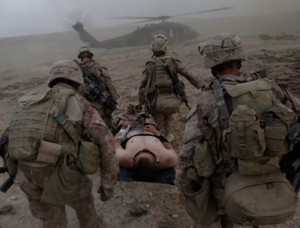When I was about 10 years old, my parents had a copy of Ernie Pyle’s book about his life in World War II. I read it and was impressed, inexperienced as I was. Ernie Pyle was killed by a sniper at Okinawa. There were great war correspondents in Korea. I remember Marguerite Higgins, who was probably the model for the woman war correspondent in WEB Griffin’s books about that war. The later reporters in Vietnam, from what I know, spent most of their time in Saigon. Higgins was walking next to Robert Capa, the greatest war photographer, when he stepped on the land mine that killed him. She didn’t hang around bars.
The only real war correspondent I know of now is Michael Yon. I read his book, Moment of Truth in Iraq and wrote a review. The only other book that compares with it is Bing West’s The Strongest Tribe but this is because West can add a lot of background from his long history going back to Vietnam. Yon had his troubles, mostly with officious PA officers in Iraq, but has had strong support from the soldiers.
With Iraq winding down, he went next to Afghanistan. Most of his reporting has been on his blog or, more recently, on his facebook page. He has had a lot of trouble with the generals in Afghanistan. Some of us who have doubts about the progress and the chances for success, tend to take his side. He was suddenly expelled from his embed with a US unit several weeks ago. Many of us believed this was due to his harsh criticism of the Canadian general who commanded the sector where a critical bridge that had been left unprotected, was blown up by the Taliban.
Please stay with me. This matters.
And so it goes like this:
Major General Nick Carter (UK) commands RC-South.
Brigadier General Daniel Menard (Canada) commands Task Force Kandahar.
Under BG Menard’s command are three U.S. Battalions and just over 2,800 Canadian forces. (U.S. battalions: 1-12 Infantry Reg.; 2-508th Parachute Infantry Regiment; 97th Military Police Battalion). American combat forces comprise a substantial portion of Menard’s force structure, leaving his command and Canadian civilian leadership open to fair scrutiny, just as American leadership is open to Canadian inquiry. Moreover, while Canada increasingly shies from combat, American units under Canadian command will spill blood under Canadian military leadership that answers to Ottawa.
Kandahar Province is apportioned into battle spaces. As mentioned, TF-Stryker has responsibilities that include Spin Boldak and FOM on Highway 4 that crosses the Tarnak River Bridge. TF-Stryker, however, is not responsible for the bridge itself.
The British Royal Air Force (RAF) is responsible for something called the GDA. The GDA is the Ground Defense Area, and is responsible for security immediately around KAF. By all accounts, the RAF is doing a fine job. The GDA includes the area around the Tarnak River Bridge.
TF-K is responsible for Kandahar, but the specific area of the bridge belongs to the RAF. However, the bridge itself is guarded not by RAF but by ANP (Afghan National Police) mentored by the American 97th MPs. The 97th is under Canadian command through TF-K. And so, at the time of the attack, TF-K was responsible for the physical security on the bridge itself, while GDA had responsibility for the land around the bridge.
Which Coalition partner has final responsibility for this strategic bridge? Is it the RAF who “own” the ground, or TF-K who mentor the ANP guarding the bridge? If an officer were to say this vital bridge is solely the responsibility of the ANP, his judgment would be deemed unsound.
This kind of frankness got him expelled. He was accused of releasing names of KIA before families had been notified. He was accused of disclosing security information that violated OPSEC. None of this was true.
The general who got him expelled ? He was court martialed and convicted. Not for the bridge incident but for other offenses.
The other general Yon has been very critical of is McChrystal.
he writes, “McChrystal is bent over the coffin of the Afghan war with a hammer in his hand and a mouth full of nails”? When asked for his thoughts on the general state of the war, he says one must be intuitive rather than deductive. “Innumerable wild cards are always flying and so the best that one can do is study hard and watch and listen and give it time to mix.” If a reliance on feelings alone is hardly the metric from which one should draft a war plan, consider the recent words of General McChrystal. The purpose of the Marjah operation was to create an “irreversible feeling of momentum,” but, “You don’t feel it here but I’ll tell you, it’s a bleeding ulcer outside.”
Yon believes the war can still be won, but that a change of command is in order. At this level of warfare, he says, “McChrystal is like a man who has strapped on ice skates for the first time. He might be a great athlete, but he’s learning to skate during the Olympics.” Yon adds that publicly denouncing the commanding general of a war is not an easy thing for him to do, especially considering it means crossing swords with General Petraeus and Secretary of Defense Robert Gates, two men he greatly admires. Indeed, if anyone can turn this war around, Yon believes it is General Petraeus. He concedes such a return to the battlefield is unlikely, and suggests another general whose name fewer people have heard. “General James Mattis from the Marines. I get a good feeling about Mattis but I don’t know. General Petraeus is a known entity and he is solid gold.”
Now, we have the new developments with McChrystal. If you want to know what is happening, read Michael Yon.
